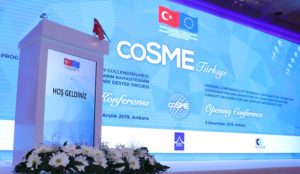
Technical Assistance for Implementation of Civil Society Dialogue and Civil Society Support Programmes (TR2015/DG/01/A5-01/001)
The overall aim of the project is to increase bilateral exchanges and cooperation between CSOs in Turkey and the EU at local, regional and national levels, to promote awareness raising initiatives on importance and benefits of membership of Turkey to the EU within Turkey and EU and on

Technical Assistance for Sorgun Enterprise Development Centre (İŞGEM)
This project was a component of the Regional Competitiveness Operational Programme which is part of the Instrument for Pre-Accession and is designed to support Turkey’s convergence with the EU by increasing the competitiveness of the Turkish economy and reducing regional socio-economic disparities. The project was designed to provide

Technical Assistance for Enhancing Coordination and Promotion of the COSME Programme and Capacity Building for SME Support Infrastructure
The main objective of this contract is increasing the intermediary organisations and SMEs’ knowledge on COSME (Competitiveness of Enterprises and Small and Medium-sized Enterprises) and to enhance the coordination capacity in the country for effective participation in the programme and the Small Business Act (SBA) framework.

Consultancy Services for Feasibility Study and Needs Analysis Related with an ‘Environment and Efficiency Centre’ within TOBB structures
An initiative that served to strengthen energy efficiency practices and renewable energy strategies of the private sector was to be of great importance to support private sector institutions in this regard. The project aimed to support Energy Efficiency practices and renewable Energy strategies of the private sector in

Conducting Awareness Raising Activities and training / ToT sessions on “Zero Waste” in Şanlıurfa Haliliye and Kilis Center
The project’s overall objective is to support municipalities’ adaptation to the “Zero Waste Directive” and other applicable standards, norms, and legislations of the Turkish Ministry of Environment and Urbanization. This project aims to raise awareness and conduct training sessions on zero waste for refugees and their host communities.

Increasing Competitiveness of Middle Black Sea Region TR83
Turkey’s Middle Black Sea region was set up in 2009 and is now well established; the Middle Black Sea Region Development Agency (OKA) carries out activities to support the economic and social development of Amasya, Çorum, Samsun and Tokat provinces. The main objective of this project was to

